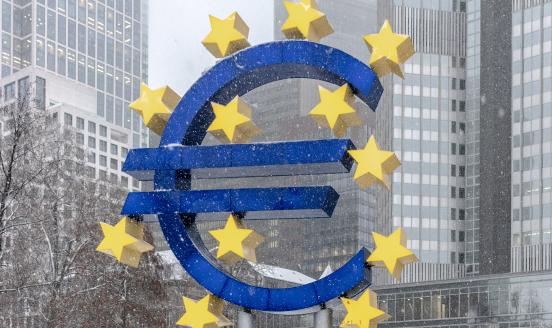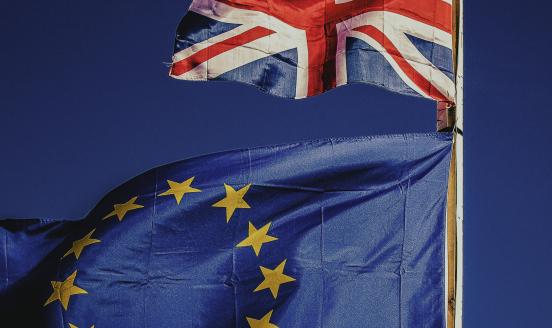Brexit, the pound and the UK current account
What’s at stake: UK PM Theresa May announced the intention to trigger article 50 by March 2017, the Pound Sterling crashed, and a dispute among Tesco
First, let’s start from an update on the expected cost. A paper by the UK Treasury that was leaked this week suggests that a hard Brexit may cost £66 billion a year. The Treasury estimates that UK GDP would be between 5.4% and 9.5% of GDP lower after 15 years if the UK left the EU with no successor arrangement, with a central estimate of 7.5%. The net impact on public sector receipts – assuming no contributions to the EU and current receipts from the EU are replicated in full – would be a loss of between £38bn and £66bn per year after 15 years, driven by the smaller size of the economy. The draft cabinet committee paper is based on forecasts from a study into the predicted impact of quitting the EU published by George Osborne in April during the referendum campaign, and that has been controversial. The FT meanwhile has estimated that the UK would need to pay a fee of as much as €20 billion to leave the EU. More than €300bn of shared payment liabilities will need to be settled in the divorce reckoning, according to EU accounts. The €20bn upper estimate covers Britain’s share of continuing multi-year liabilities, including unpaid budget appropriations of €241 billion, pensions liabilities of €63.8 billion and future contractual and other spending commitments totalling about €32 billion.
Coming to the currency, Ashoka Mody argues that contrary to the dominant narrative, the pound’s depreciation carries a cheery message. The composite picture from financial markets tells the following story: Britain within the European Union became a magnet for speculative international financial capital; from its unrivalled role as financial gateway to Europe, arose a property-buying frenzy in London and neighbouring districts; silently but damagingly, the finance-property bubble also bid up the value of the pound, causing the pound to become overvalued for all other sectors of the British economy. Britain, quite literally, was living on borrowed time: British producers lost competitiveness at home and abroad and the sense that the British public was richer because the pound was stronger was an illusion. Mody argues that Brexit has fortuitously corrected this long-standing distortion in the British economy. The depreciation of the pound has corrected an overvaluation of the pound, improving the prospects of domestic producers. Rather than imposing a long-term cost, Brexit may, through a more reasonably priced pound, help expand British trade and productivity.
Paul Krugman has some notes on Brexit and how we should think about the drop in the Pound. Krugman argues that we should look at this is in terms of “home market effect” for trade in financial services. Financial services are subject to both internal and external economies of scale, which tends to concentrate them in a handful of huge financial centers around the world, one of which is the City of London. But now we face the prospect of seriously increased transaction costs between Britain and the rest of Europe, which creates an incentive to move those services away from the smaller economy (Britain) and into the larger (Europe). The smaller economy (Britain) can try to prevent this by paying lower wages and therefore make up in competitiveness what it lacks in market access. In effect, Britain would need a weaker currency to offset this adverse impact of its smaller market. Krugman argues that pre-Brexit, Britain was experiencing a version of the so-called Dutch disease. In its traditional form, this referred to the way natural resource exports crowd out manufacturing by keeping the currency strong. In the UK case, the City’s financial exports play the same role. So their weakening helps British manufacturing – and, maybe, the incomes of people who live far from the City and still depend directly or indirectly on manufacturing for their incomes. The policy moral is that a weaker pound shouldn’t be viewed as an additional cost from Brexit, it’s just part of the adjustment. And it would be a big mistake to prop up the pound: old notions of an equilibrium exchange rate no longer apply.
UBS’ Global Co-Head of FX & Rates Strategy Themos Fiotakis writes on FT Alphaville that this is more more than a flash crash in sterling. Undoubtedly, uncertainties related to Brexit are a key driver of sterling weakness. Yet the fact that the pound has so far borne so much of the burden of those uncertainties is neither a coincidence nor a political miscalculation by market participants: it is a sign of underlying afflictions pre-dating the UK’s vote to leave.
From a currency perspective, the UK has entered this period of uncertainty from a disadvantageous starting point. The outsized UK current account deficit (currently at around 6% of GDP) suggests that the country is currently living well beyond its means because, in economic terms, very high current account deficits equate to deeply negative rates of aggregate savings. That the story told by this external deficit is largely benign between 2008 and early 2013 – when the UK’s economic recovery outpaced that of the rest of the world – but it turned sour between late 2013 and 2015, when income from the overseas earnings of UK-domiciled companies and the foreign investments of UK residents declined. This deterioration meant that the level of spending in the UK was no longer easy to finance from income generated abroad. Normally, this would have led to an economic deceleration and a gradual decline in sterling – which would ultimately have led the UK’s flow of funds back to balance. But this did not happen and over the past three years, the economy has extended its run on borrowed funds – funds which flew into the UK in the form of foreign direct investment on an unprecedented scale and were channelled in high proportion into real estate and infrastructure investments. Brexit or not, Fiotakis argues, these inflows would eventually moderate, as the supply of new real estate and infrastructure picks up and price growth eases. But the uncertainties relating to the UK’s post-Brexit status obviously make this inflow of capital even less sustainable.
Writing on Bank Underground - the Bank of England staff’s blog - Lauren Bowers also looks at the UK current account, and its financing. Since the financial crisis the UK’s fiscal and current account balances have persistently been in deficit. These ‘twin’ deficits are significant in historical terms, with a record peacetime fiscal deficit in 2009 and a record current account deficit in 2015. But how closely related are these ‘twins’ and do they pose a risk to financial stability?
Using a new ‘from-whom-to-whom’ dataset of sectoral balances, Bowers finds that the two deficits are not directly related to each other and argues that are being financed through relatively stable channels. The picture is one in which the financial sector has been increasingly financing the fiscal deficit through purchases of gilts, and foreign investment in private non-financial corporations has been driving the increased current account deficit. A proportion of FDI inflows and other private sector funds have being recycled through the financial system and in turn used to finance the fiscal deficit. So there is a link between the two deficits but Bowers do not think it should be worrying, for two reasons. First, the fiscal deficit has been increasingly financed by the domestic financial sector and domestic holdings may be more stable than foreign holdings where exchange rate risk is a concern. Second, with respect to the current account, the worsening of the IIP post-crisis has primarily been driven by inward FDI, and these are investments with a controlling interest and therefore often associated with stable and long-lasting financing relationships, as well as being less vulnerable to refinancing risk. While the recent EU referendum result may influence new FDI inflows, Bowers argues that the reversal of existing investments is still unlikely relative to other types of financing, so this trend does not appear to pose significant risks.
Grep Ip on the Wall Street Journal writes that the plunge in the pound sterling and an uptick in British government yields are a completely logical adjustment to the changed environment in which Britain will soon find itself. For British companies’ products to remain competitive, they will either have to cut their prices or find buyers in other markets that transportation and trade barriers had previously made unappealing. In either case, more costs will be incurred producing the same exports, which undermines already lackluster productivity. Lower sterling compensates by reducing British costs relative to other countries.
Because what Britons sell will be less competitive, their standard of living must also drop relative to the rest of the world. Lower sterling does that too. As import prices rise, so will inflation, cutting into real wages. British consumption will shift towards domestic from foreign products. However, Britain is already near full employment and does not have the productive capacity to both make more exports and replace imports. The Bank of England cannot keep rates low forever in the face of productive constraints and higher inflation. Eventually, higher interest rates must tamp down domestic consumption and smooth the way for the reorientation of productive capacity. Britain has the developed world’s largest current-account deficit. Financing that deficit relies on the world’s willingness to buy British stocks and bonds, which in turn depends on their confidence that British profits and incomes can service those obligations. Brexit impairs that, so Britain cannot rely so much on the kindness of strangers to finance its consumption. Ip argues that lower sterling helps in several ways. By boosting exports and dampening imports, it will help narrow the trade component of the current-account deficit. By increasing the value of British investments abroad, it improves the investment-income deficit. And by reassuring foreign investors that future appreciation is more likely, a cheap pound eases the financing of the deficit.
While the former BoE governor Mervyn King is reported to have said that the fall in Sterling is a “welcome change” that has generated “reactions which are over the top”, Simon Wren-Lewis of Mainly Macro is asking himself a very unusual question: did the Bank of England (BoE), by any chance, cause Brexit?
The question is grounded on the hypothesis that the BoE might have missed an important change in the labour market structure. The reasoning goes as follows. Suppose that by the mid-2000s, immigration from the EU (and the potential for additional immigration) had led to an important shift in the UK labour market, so that the natural rate of unemployment (NAIRU) has fallen. While this is a thought-exercise, Wren-Lewis cites a report by Paul Gregg and Steve Machin, providing some evidence of a structural shift in the UK labour market in the mid-2000s. The meaning of this is that unemployment could be lower without leading to wage increases that threaten the inflation target, because workers fear that the employer can resort to finding much cheaper overseas labour.
Ideally, the Bank should realise that there has been a change because wages will start falling faster than they would expect based on previous relationships. However that effect may be masked by the well documented employee and employer reluctance to actually cut nominal wages. Add in the shock of the financial crisis, and this change in the way the labour market works might well be missed. How does all this link to Brexit? Wren-Lewis argues that if the change did occur, and if the Bank of England had acknowledged the structural change in the labor market, then monetary policy would be much more expansionary, bringing unemployment well below the 5% mark. Nominal wage growth would have been stronger, and a buoyant labour market would have generated a feel good factor among workers. With more vacancies and less unemployment, concerns about immigration would have begun to fade. The Brexit vote would still have been close, but would have gone the other way.



